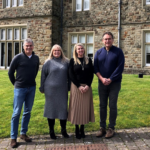KCS Group Europe Highlights Need For Thorough Due Diligence
Corporate security firm KCS Group Europe (KCSGE) warns that the rapid growth of the arts and creative sector in the UK has increased the need for thorough due diligence.
Globally, the net worth of the creative industries is worth 3% of world GDP. That includes television, visual arts, publishing, gaming and music. It is one of the UK’s fastest growing economic sectors, but with that comes risk.
KCSGE Director of Operations, Leon Goldman, says: “There is risk attached at a number of levels, ranging from art forgeries to AI in the music industry. Organisations do not always recognise the level of liability they have if it goes wrong.”
Full provenance checks should be carried out for all items acquired or on loan. These include establishing the legal owners of artefacts, consideration of theft and looting during conflicts, excavation, export and import and the transportation of objects.
Goldman adds: “These checks have become more complicated with the growth of internet sales and auctions. At the high end of the market, art dealers are accustomed to making these assessments – and still sometimes get it wrong – but with objects at the lower range, checks may be less thorough or entirely absent.
“The marketplace is littered with obscure provenances, secrecy and a lack of regulation. Not even art ‘experts’ can always agree.
“There are basic principles which can be applied – authentication, condition, title and provenance, legal compliance and valuation. And the buyer needs to ask themselves what level of recompense exists if the work is a forgery.”
For galleries and dealers, the cost of indemnifying forgeries is rising. Art dealers Sotheby’s, for example, has a five-year guarantee of refund.
There are occasions when items unexpectedly become popular. The Sunday Times reported that dinosaur bones are becoming a hot collector’s item. This week, the skeleton of a tyrannosaurus rex fetched $6.1 million at a Swiss auction.
In the past, bids would have come exclusively from museums or academic institutions. Now these bones are being snapped up by the super-wealthy to decorate their homes, or corporate office blocks.
Fossil collectors, or commercial palaeontologists, dig out the bones in order to sell them. With record prices, it’s easy to understand why the less-than-scrupulous may be attracted to the trade.
The music industry is particularly vulnerable to copyright infringement. Within the past few days a song featuring AI-generated lyrics, purportedly from Drake and the Weeknd, has been pulled from streaming services after notching up millions of viewers and listeners on TikTok and Spotify.
Goldman points out: “Streaming platforms have a fundamental responsibility to prevent the use of material that damages the artist, or artists. However, the speed at which transmission takes place and the ability to use AI-generated content is a particular worry to those in the industry.
“The high stakes involved, and technology, may encourage conmen and tricksters, and new platforms make it more difficult to police. Due diligence could help to prevent personal losses and reputational damage to your organisation.”
Further information on the services provided by KCSGE can be found at www.kcsgroup.com
